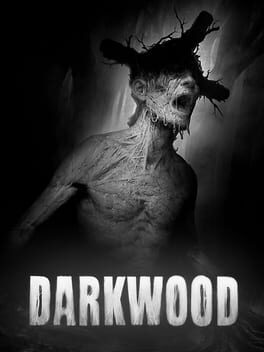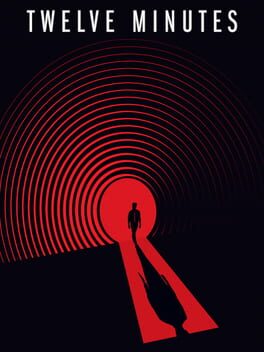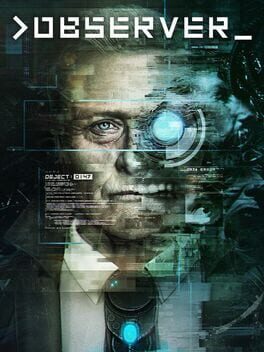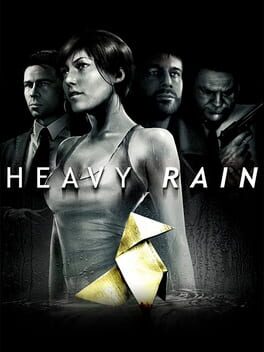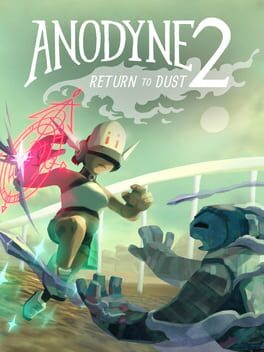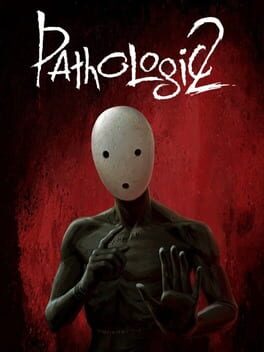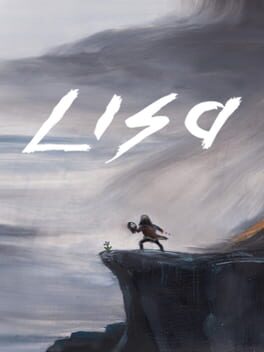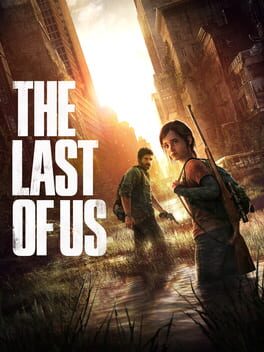TheGameTuber
2017
Most horror games really work for me because they tell scary stories more than mechanically scaring me in the moment. I love SOMA dearly because its story, in spite of what even the developers agree is pointless gameplay, was special. There are exceptions... an exception? The resident evil series, despite its immense dumbness, has managed to frighten me pretty much 100% mechanically.
Darkwood is special because it can join resident evil in that exclusive club of horror games that can really viscerally get me, and it doesn't have to be dumb as a bag of rocks either. Im not gonna call it genius, but Darkwood is clearly operating on a higher level than it ever had to. The dialogue has an opaque, heavy quality to it that bears sinking your teeth into to find meaning.
The real main event here is the visual and audio presentation. The game is uniquely presented in a top-down perspective, with your characters vision limited to line-of-sight within a narrow cone. The game visually obscures things from you just enough to stress you out, while making sure you can HEAR them coming long before you see them. Darkwood knows your imagination is the scariest game of all, and masterfully plays your senses + your mind to convince you that a barricaded door is all that stands between you and a nightmarish death.
Darkwood needs to be seen to be believed, and if you enjoy horror games whatsoever, it is a must-try.
Darkwood is special because it can join resident evil in that exclusive club of horror games that can really viscerally get me, and it doesn't have to be dumb as a bag of rocks either. Im not gonna call it genius, but Darkwood is clearly operating on a higher level than it ever had to. The dialogue has an opaque, heavy quality to it that bears sinking your teeth into to find meaning.
The real main event here is the visual and audio presentation. The game is uniquely presented in a top-down perspective, with your characters vision limited to line-of-sight within a narrow cone. The game visually obscures things from you just enough to stress you out, while making sure you can HEAR them coming long before you see them. Darkwood knows your imagination is the scariest game of all, and masterfully plays your senses + your mind to convince you that a barricaded door is all that stands between you and a nightmarish death.
Darkwood needs to be seen to be believed, and if you enjoy horror games whatsoever, it is a must-try.
The Last Of Us Part II is a huge departure from the style of the first game. Where Part I was a thoroughly "it is what it looks like" affair, a straightforward story about a relationship with a neat little twist at the end to give you a new perspective, Part II is much more ambitious. Its got THEMES.
There are mechanical subversions in the name of themes, story beats reassert those themes, the game might even intentionally toy with the level designs enjoyability to make the player empathize with certain characters better? I could describe it as an indie game story made on a GTA budget, and I really wanted to enjoy it, but I'm afraid the game just didn't do it for me.
The biggest crime of all is length. Where the first game could not have been over 20 hours long, Part II feels like it needs close to FORTY HOURS to complete, including a totally unnecessary final act which sucks all energy out of what could have been a perfectly satisfying climax.
Many of my gripes with the first game still stand. The tender, introspective story found in the cutscenes clashes with the hours-long murder holes one regularly finds themselves stuck in. For a game that wants to subvert our attachment to the First's protagonist, this one indulges in gratuitous flashbacks to him several times. The game wants to critique the consequences of protagonist-brain, solipsistic worldviews, but cannot conceive of a world in which a single girl can't kill like 500 people because she was Built Different.
I think a story that focused on Abby primarily would have been a solid 4 from me. The Ellie stuff drags this game down hard.
There are mechanical subversions in the name of themes, story beats reassert those themes, the game might even intentionally toy with the level designs enjoyability to make the player empathize with certain characters better? I could describe it as an indie game story made on a GTA budget, and I really wanted to enjoy it, but I'm afraid the game just didn't do it for me.
The biggest crime of all is length. Where the first game could not have been over 20 hours long, Part II feels like it needs close to FORTY HOURS to complete, including a totally unnecessary final act which sucks all energy out of what could have been a perfectly satisfying climax.
Many of my gripes with the first game still stand. The tender, introspective story found in the cutscenes clashes with the hours-long murder holes one regularly finds themselves stuck in. For a game that wants to subvert our attachment to the First's protagonist, this one indulges in gratuitous flashbacks to him several times. The game wants to critique the consequences of protagonist-brain, solipsistic worldviews, but cannot conceive of a world in which a single girl can't kill like 500 people because she was Built Different.
I think a story that focused on Abby primarily would have been a solid 4 from me. The Ellie stuff drags this game down hard.
2021
I dont want to revel in this game's failures, but I find it interesting in how dated it is. It was apparently in development for 7 years and it feels like it--12 Minutes is a ceolacanth of 2010s critical darling narrative game design.
Multiple twists as the primary driver of interest in the story? Liberal use of dark/twisted events to "earn" the story its artistic merit? Fixation on a single emotional beat, at the expense of variety/depth? Clamoring for Hollywood prestige by casting stars who are clearly out of their element?
I feel that the time-loop concept has legs, but its hard to give the game much benefit of the doubt when the performances really are just that bad. Daisy Ridley responds to her husband being choked to death like I do when my cat scratches my furniture. Willem Dafoe belts out strange breathless sound bites that cut off half a second too early. Clicking rapidly on a home invader as he attempts to murder your wife results in a comedically-timed "Sir?! Sir?! Sir?!"
I'd feel dishonest calling it BAD, but I expected much more.
Multiple twists as the primary driver of interest in the story? Liberal use of dark/twisted events to "earn" the story its artistic merit? Fixation on a single emotional beat, at the expense of variety/depth? Clamoring for Hollywood prestige by casting stars who are clearly out of their element?
I feel that the time-loop concept has legs, but its hard to give the game much benefit of the doubt when the performances really are just that bad. Daisy Ridley responds to her husband being choked to death like I do when my cat scratches my furniture. Willem Dafoe belts out strange breathless sound bites that cut off half a second too early. Clicking rapidly on a home invader as he attempts to murder your wife results in a comedically-timed "Sir?! Sir?! Sir?!"
I'd feel dishonest calling it BAD, but I expected much more.
2017
Observer has its rough edges for sure, but I will never forget the masterful dream eater sequences--visually splendorous, just obtuse enough to sink your teeth into, but just meaningful enough to feel rewarding. I think these sequences are some of the best material bloober team has ever done, and it makes up at least half the game, so there is value here.
Without spoiling anything, the game kind of goes off the deep end in the final quarter. The Observer I fell in love with was primarily a series of terrifying personal vignettes, that drew horror from the terror of living through late capitalism and fascist rule. Observer ends with a high-stakes, plot-forward, family drama sequence that feels disconnected and unsatisfying to me.
Some may have a problem with Observer's lack of interactivity -- it has been called a "walking simulator" by people who use that term seriously. I personally disagree with the very validity of the term, but to those on the fence, I would argue that the games brevity and its pacing are strengths, and that not all games need to accomplish the same goals in the same ways.
Observer had a "redux" re-release this year, with additional "content" and updated visuals. The visuals are indeed spectacular, but I would honestly recommend that people just play a release copy so as to avoid the (imo) abysmal new missions. They stick out like a sore thumb and are laughably bad, bad enough to lessen the overall experience.
Without spoiling anything, the game kind of goes off the deep end in the final quarter. The Observer I fell in love with was primarily a series of terrifying personal vignettes, that drew horror from the terror of living through late capitalism and fascist rule. Observer ends with a high-stakes, plot-forward, family drama sequence that feels disconnected and unsatisfying to me.
Some may have a problem with Observer's lack of interactivity -- it has been called a "walking simulator" by people who use that term seriously. I personally disagree with the very validity of the term, but to those on the fence, I would argue that the games brevity and its pacing are strengths, and that not all games need to accomplish the same goals in the same ways.
Observer had a "redux" re-release this year, with additional "content" and updated visuals. The visuals are indeed spectacular, but I would honestly recommend that people just play a release copy so as to avoid the (imo) abysmal new missions. They stick out like a sore thumb and are laughably bad, bad enough to lessen the overall experience.
2010
Most people will agree Heavy Rain is bad. The writing and performances are just dreadful, and the clunky interactive button-prompt cutscenes are incredibly awkward, prone to sinking any suspension of disbelief the game happens to build up on the way. Lots of people enjoy HR ironically, as a videogame equivalent to B-movies, something to be pushed to it's breaking point, and gawked at with friends. I know because that's what I did!
But, at the same time, I can't forget the experiences of my many friends who played the game on release and took it at face value, not really questioning the experience until years later when the game became a sort of meme. Were they too young to know a bad story when they saw it? Were the standards of AAA gaming so low in 2010 that a dud like Heavy Rain could be taken seriously? I mean, yes to both, but in playing it ironically I can't lie. There is value in the games pacing, its weird branching unpredictability, the finality of the choices. In 2010 it really was rare to find a tentpole game with so little padding content crunch, and such a grounded, personal story, even if the execution kind of flops.
Any playthrough of Heavy Rain will result in a LOT of laughter and confusion, but I think it deserves to be remembered as more than just a meme.
But, at the same time, I can't forget the experiences of my many friends who played the game on release and took it at face value, not really questioning the experience until years later when the game became a sort of meme. Were they too young to know a bad story when they saw it? Were the standards of AAA gaming so low in 2010 that a dud like Heavy Rain could be taken seriously? I mean, yes to both, but in playing it ironically I can't lie. There is value in the games pacing, its weird branching unpredictability, the finality of the choices. In 2010 it really was rare to find a tentpole game with so little padding content crunch, and such a grounded, personal story, even if the execution kind of flops.
Any playthrough of Heavy Rain will result in a LOT of laughter and confusion, but I think it deserves to be remembered as more than just a meme.
1999
Shenmue was hugely progressive for its time -- the realistic, detailed world design, the ambitious mix of gameplay genres, the enormous scope -- though as AAA games have iterated on the formula, Shenmue has basically been remembered as a rough-edged curiosity that exists more for historical discussions than to actually be played.
I went back to Shenmue in 2020. Its rough, sure, but I really do think there's something special here? Shenmue will make you intimately familiar with a Japanese town in the late 80s, rummaging through furniture in first person, talking to locals and navigating city streets by landmarks and real maps (no minimap or compass here)! Solving the mystery of your fathers murder feels consistent and well-earned, and the weirdly amateurish/quaint charm of the production kind of synergizes with what I think is a legitimately compelling mystery adventure game..?
Everything does not stick the landing, though. Controls are clumsy, the fighting never happens often enough to really figure out how it works, and there's not enough distractions in this small town to fill up the days of waiting that happens during this slow-burn, slice-of-life story.
The game has a slog of a forklift section near the end. If you enjoyed the game as much as I did up until that point, you have my permission to skip ahead to the FAR more interesting Shenmue 2. You basically know all you need to know by that point.
I went back to Shenmue in 2020. Its rough, sure, but I really do think there's something special here? Shenmue will make you intimately familiar with a Japanese town in the late 80s, rummaging through furniture in first person, talking to locals and navigating city streets by landmarks and real maps (no minimap or compass here)! Solving the mystery of your fathers murder feels consistent and well-earned, and the weirdly amateurish/quaint charm of the production kind of synergizes with what I think is a legitimately compelling mystery adventure game..?
Everything does not stick the landing, though. Controls are clumsy, the fighting never happens often enough to really figure out how it works, and there's not enough distractions in this small town to fill up the days of waiting that happens during this slow-burn, slice-of-life story.
The game has a slog of a forklift section near the end. If you enjoyed the game as much as I did up until that point, you have my permission to skip ahead to the FAR more interesting Shenmue 2. You basically know all you need to know by that point.
2005
Hugely influential, not just for its controls and mechanics, but for its earnest desire to please. Something new is introduced every 5-10 minutes in a feat of pacing that makes the game addicting and always refreshing.
IMHO, the pacing breaks down a bit in the final chapter, but I wouldn't trade this insane joyful roller coaster ride the way it is for a second.
IMHO, the pacing breaks down a bit in the final chapter, but I wouldn't trade this insane joyful roller coaster ride the way it is for a second.
2001
SH2 is a difficult to talk about critically, because it is both a formative, progressive horror game for the time, and a deeply flawed work with vestigial horror game trope elements that drag the experience down.
Its nearly impossible to criticize the game in 2020 without subtly falling into contrarian response to the game's reputation and context more than the work itself. People defending it are all too likely to give generous benefit-of-the-doubt and assume intent where there probably is none.
I will readily praise Silent Hill 2 for its impenetrable atmosphere, emotional character drama, and freaky exploration. I don't need to forgive it's abysmal combat, obtuse busywork or silly performances to do so.
Its nearly impossible to criticize the game in 2020 without subtly falling into contrarian response to the game's reputation and context more than the work itself. People defending it are all too likely to give generous benefit-of-the-doubt and assume intent where there probably is none.
I will readily praise Silent Hill 2 for its impenetrable atmosphere, emotional character drama, and freaky exploration. I don't need to forgive it's abysmal combat, obtuse busywork or silly performances to do so.
2013
A colorful and imaginative world can't save Bioshock Infinite from the low-brow junk food bin we all know it belongs in. Infinite is a truly pretentious game that wants you to believe it has lots of Important Points to make about the American Myth, Race and Revolution, but really it just wants you to shoot guys in the face with a fireball and collect junk out of a desk drawer. Far better-spoken people than I have already laid this game out, both in the narrative and mechanical departments.
Infinite is a disappointment to the Bioshock name, itself not a particularly high bar, and mostly deserves to be forgotten.
Infinite is a disappointment to the Bioshock name, itself not a particularly high bar, and mostly deserves to be forgotten.
In a year of what feels like 5 all-time favorite games to me, Anodyne 2 stands out for its nostalgic, childish approachability, but also its surprisingly mature themings and sharp writing. Over the course of about 12 hours, I remembered what it was like to be a kid again, and also re-experienced some painful parts of growing up. Theming-wise theres a lot going on here, too much for me to recognize it all on one playthrough, but I feel like something will resonate with basically everyone.
A recommendation for Pathologic 2 or Disco Elysium would come with lots of qualifiers but I think I could recommend this game to anyone. It's at the same time progressive and immediately charming.
A recommendation for Pathologic 2 or Disco Elysium would come with lots of qualifiers but I think I could recommend this game to anyone. It's at the same time progressive and immediately charming.
2019
This is probably the best art game I've ever played.
Though it doesn't have a style like a painting, or cinematic motion-capture drama, or a call-to-action moral, it stuck with me more than any game. P2 is an art game because it uses interactive elements to force a subjective emotional experience on the player. Pathologic 2 is a stressful, punishing, obtuse experience -- but always for a reason. Fumbling through the campaign mechanically encourages the player to consider the game's written themes and reflect on themselves as well as their own beliefs.
Without getting into spoilers, this game made me reconsider how I live my life and how I work on personal relationships in my real life. Very, very few games can say they have had that kind of impact on me. Maybe none?
Pathologic 2 definitely is NOT for everyone, but if you like what I've described, or enjoy any of the following games, please consider buying it:
-LISA: The Painful RPG
-STALKER
-Morrowind
-EYE Divine Cybermancy
-Rain World
Though it doesn't have a style like a painting, or cinematic motion-capture drama, or a call-to-action moral, it stuck with me more than any game. P2 is an art game because it uses interactive elements to force a subjective emotional experience on the player. Pathologic 2 is a stressful, punishing, obtuse experience -- but always for a reason. Fumbling through the campaign mechanically encourages the player to consider the game's written themes and reflect on themselves as well as their own beliefs.
Without getting into spoilers, this game made me reconsider how I live my life and how I work on personal relationships in my real life. Very, very few games can say they have had that kind of impact on me. Maybe none?
Pathologic 2 definitely is NOT for everyone, but if you like what I've described, or enjoy any of the following games, please consider buying it:
-LISA: The Painful RPG
-STALKER
-Morrowind
-EYE Divine Cybermancy
-Rain World
2014
In a world full of Apocalypse Dad Games trying to make you cry about parenthood, LISA: The Painful defies all expectations and manages to make a cliched game premise work, in none of the ways you expected it to, and in a deeply troubled gameplay genre, Turn-based RPG.
LISA is a downright sinister game with a sense of humor that isnt afraid to get dark, or weird, or both. To say more would be a disservice to anyone who hasn't played yet, but it is more than worth your time.
LISA is a downright sinister game with a sense of humor that isnt afraid to get dark, or weird, or both. To say more would be a disservice to anyone who hasn't played yet, but it is more than worth your time.
2013
TLOU deserves credit for its powerful performances and character-driven story, though I cant help but feel it is moving in the wrong direction.
Many see TLOU as the first video game to reach a level of mass appeal and maturity deserving of respect on the level of a blockbuster movie or prestige TV show. This is definitely true, if the bar for respect is sufficiently convincing technical/acting performances, or writing with an emotional core more engaging than historical AAA standards.
While I cant speak for everyone, I believe the ideal video game would primarily use interactive elements to shape our experiences. Naughty Dog does not seem to agree; the emotional cornerstone of the game -- Joel and Ellie's complicated relationship -- functions because good work was put into the cutscenes and the ambient dialogue between combat encounters. Combat, stealth, and scavenging encounters themselves, though, function mostly as a fun distraction, something to fluff the length of what could've been a compelling miniseries into a sufficiently-long clump of Video Game Content. The dozens, if not hundreds, of zombie and human bodies Joel and Ellie leave behind over the course of this game only makes it feel immature and insecure in its desire to give us a tender and personal story about relationships.
Equally immature is the theming. I feel that the game wants to make SOME kind of point regarding toxic parenting and trauma, but fails to articulate it and most of the story feels like a simple relationship being played very straight, with a twist existing more so to shock the player than to make a cohesive point. Again, I must say that the relationship is well done, but I expect more out of games, especially games lauded as breakouts in narrative design.
TLOU is what it is: a very engaging and well-made blockbuster, and nothing more, nothing less.
Many see TLOU as the first video game to reach a level of mass appeal and maturity deserving of respect on the level of a blockbuster movie or prestige TV show. This is definitely true, if the bar for respect is sufficiently convincing technical/acting performances, or writing with an emotional core more engaging than historical AAA standards.
While I cant speak for everyone, I believe the ideal video game would primarily use interactive elements to shape our experiences. Naughty Dog does not seem to agree; the emotional cornerstone of the game -- Joel and Ellie's complicated relationship -- functions because good work was put into the cutscenes and the ambient dialogue between combat encounters. Combat, stealth, and scavenging encounters themselves, though, function mostly as a fun distraction, something to fluff the length of what could've been a compelling miniseries into a sufficiently-long clump of Video Game Content. The dozens, if not hundreds, of zombie and human bodies Joel and Ellie leave behind over the course of this game only makes it feel immature and insecure in its desire to give us a tender and personal story about relationships.
Equally immature is the theming. I feel that the game wants to make SOME kind of point regarding toxic parenting and trauma, but fails to articulate it and most of the story feels like a simple relationship being played very straight, with a twist existing more so to shock the player than to make a cohesive point. Again, I must say that the relationship is well done, but I expect more out of games, especially games lauded as breakouts in narrative design.
TLOU is what it is: a very engaging and well-made blockbuster, and nothing more, nothing less.
